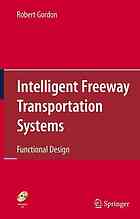

Most ebook files are in PDF format, so you can easily read them using various software such as Foxit Reader or directly on the Google Chrome browser.
Some ebook files are released by publishers in other formats such as .awz, .mobi, .epub, .fb2, etc. You may need to install specific software to read these formats on mobile/PC, such as Calibre.
Please read the tutorial at this link: https://ebookbell.com/faq
We offer FREE conversion to the popular formats you request; however, this may take some time. Therefore, right after payment, please email us, and we will try to provide the service as quickly as possible.
For some exceptional file formats or broken links (if any), please refrain from opening any disputes. Instead, email us first, and we will try to assist within a maximum of 6 hours.
EbookBell Team

0.0
0 reviewsIntelligent Freeway Transportation Systems: Functional Design focuses on the efficient use of resources in the design of ITS. The author discusses the principles of top down design starting with objectives and requirements, and provides guidance for the development and evaluation of functional design alternatives according to cost effectiveness principles. This book describes how transportation planning principles and traffic diversion principles relate to functional ITS device selections and equipment locations. Methodologies for translating objectives to functional device types are provided. Application factors to identify device deployment densities (e.g. number of detectors per mile) as a function of traffic conditions are provided, as are models for evaluating the benefits of design alternatives based on traffic conditions. Methodologies for the best placement of CCTV cameras and changeable message signs are discussed. Design guidance includes the following functions:
Methodologies for the evaluation of ITS benefits to compare alternative designs and assist in the selection of the best alternative are also provided.
Intelligent Freeway Transportation Systems: Functional Design is appropriate for engineers and decision makers engaged in the scoping and preliminary design of ITS as well as for university courses on this subject. P>